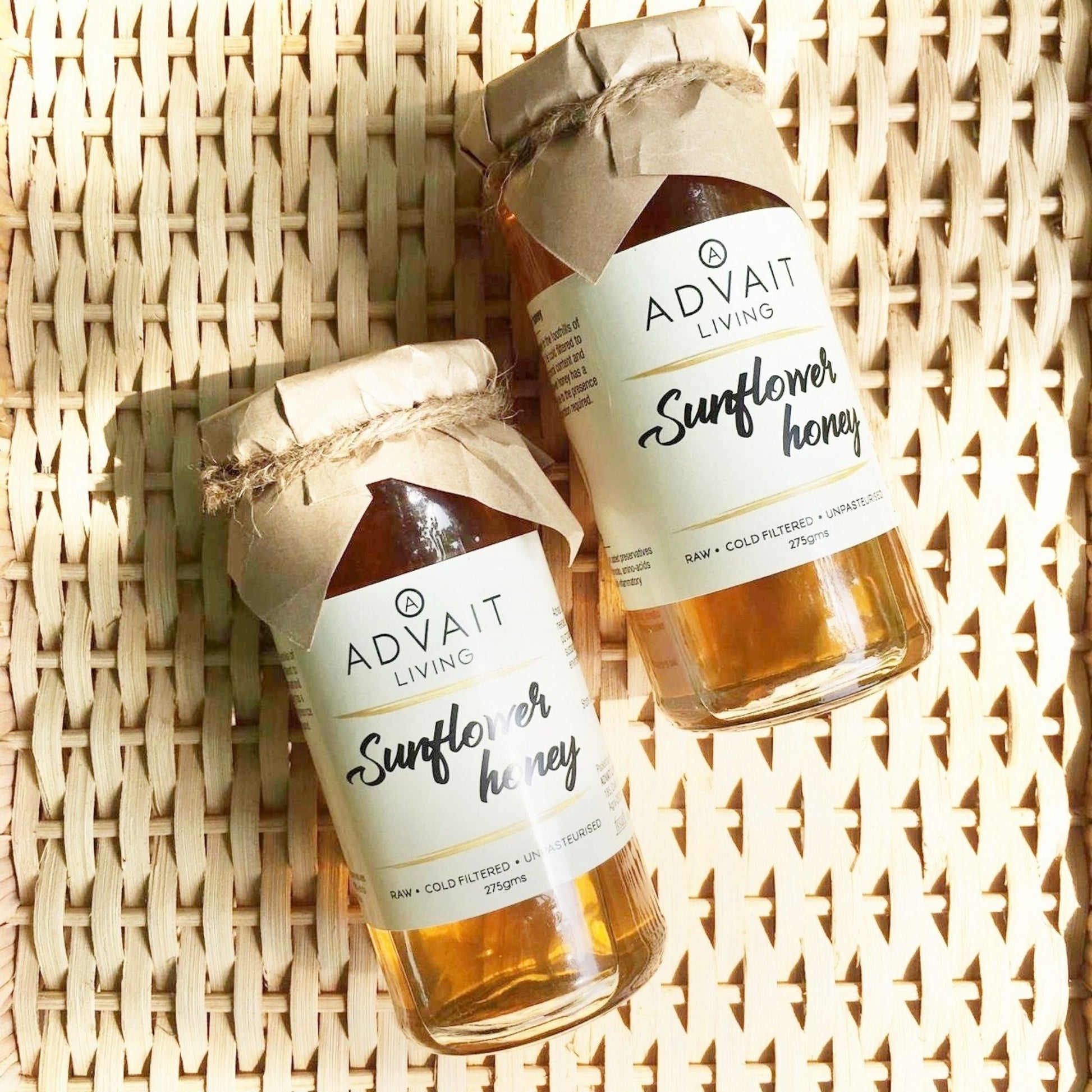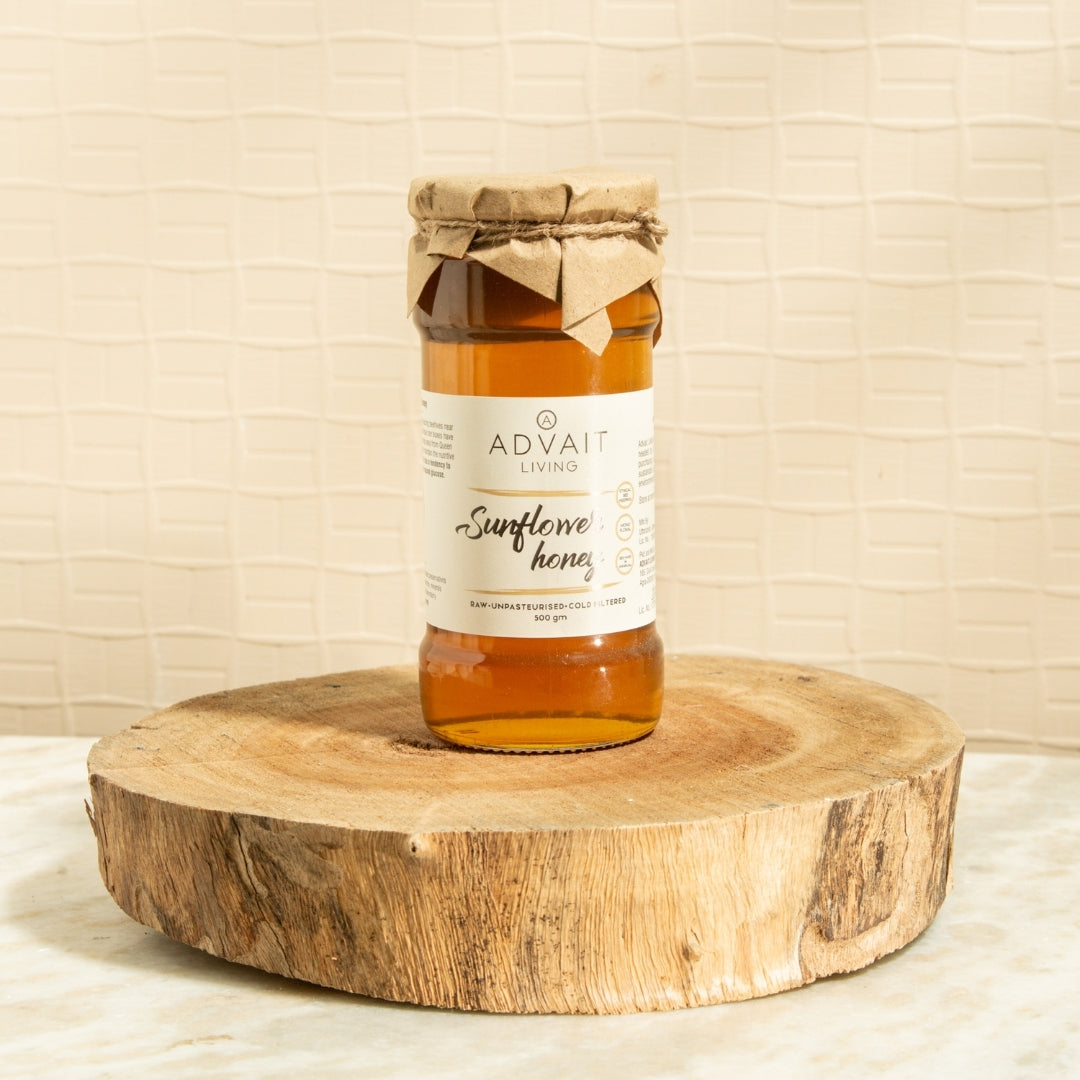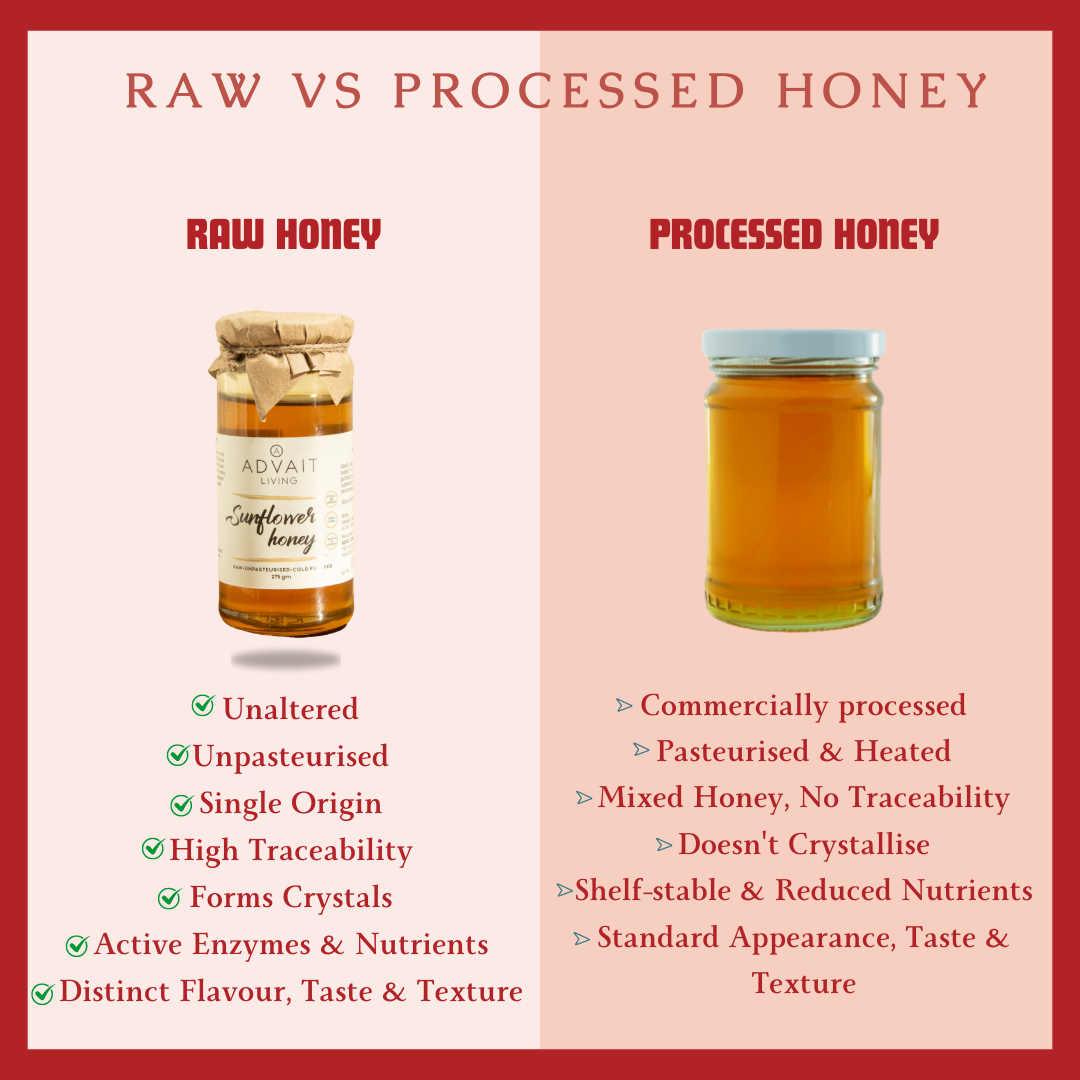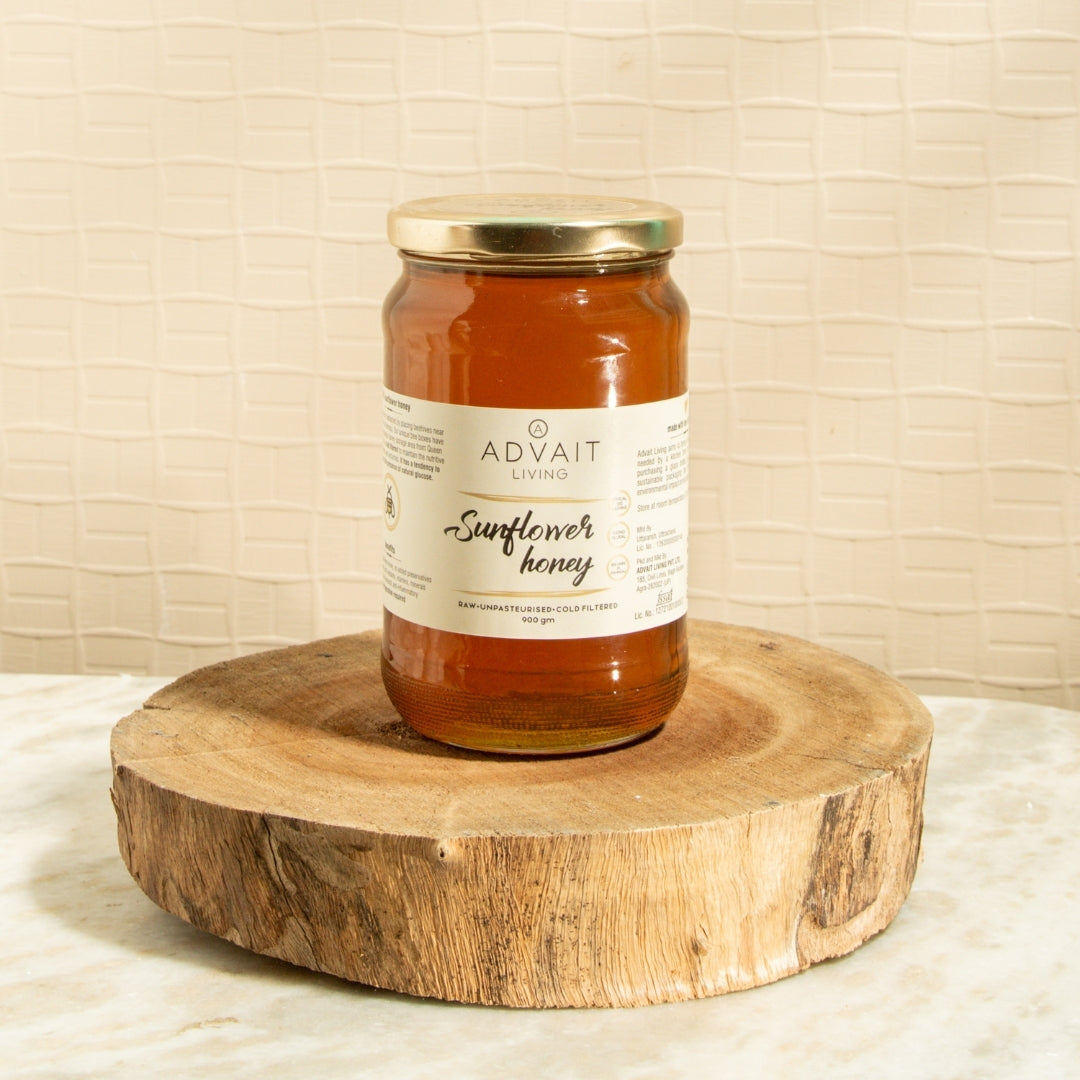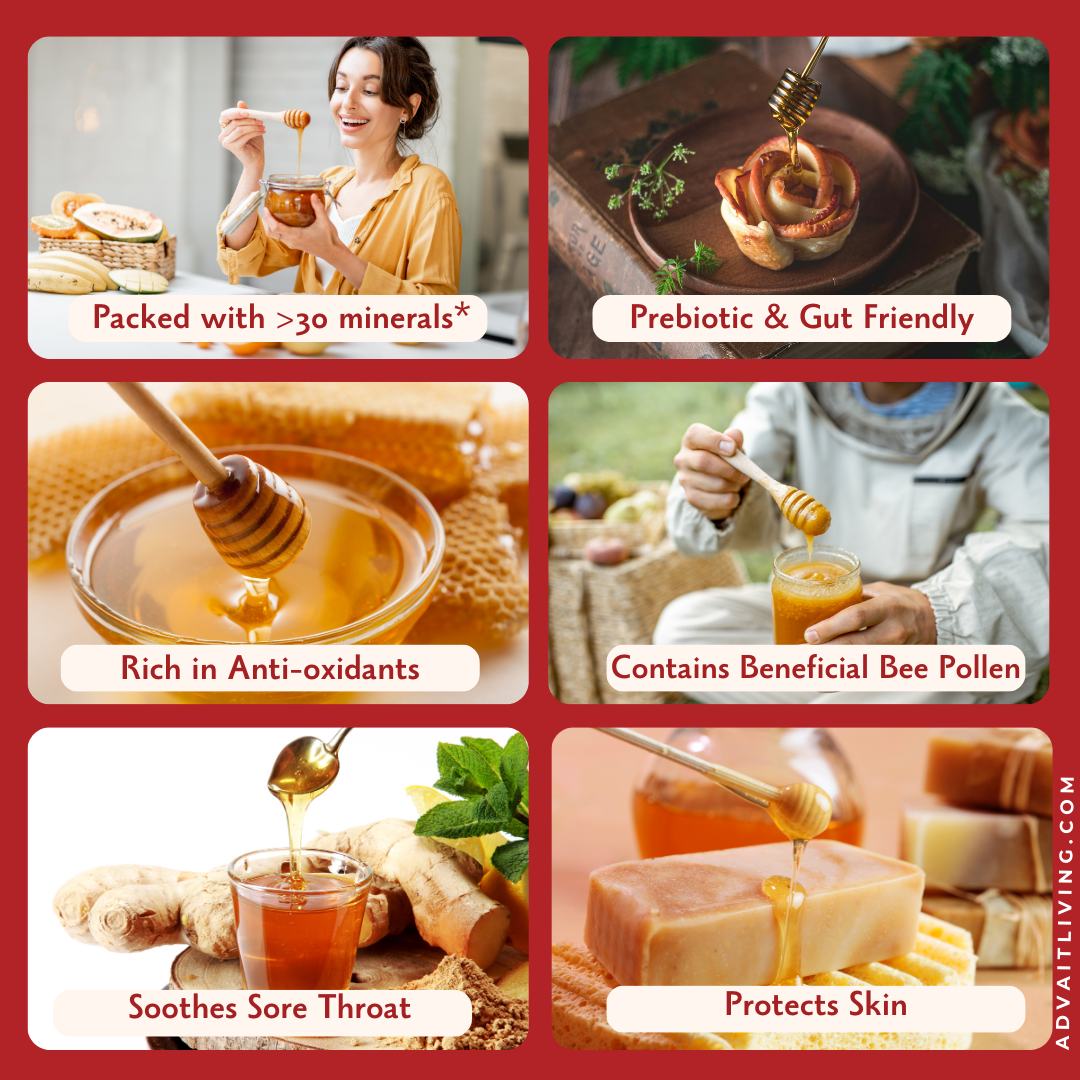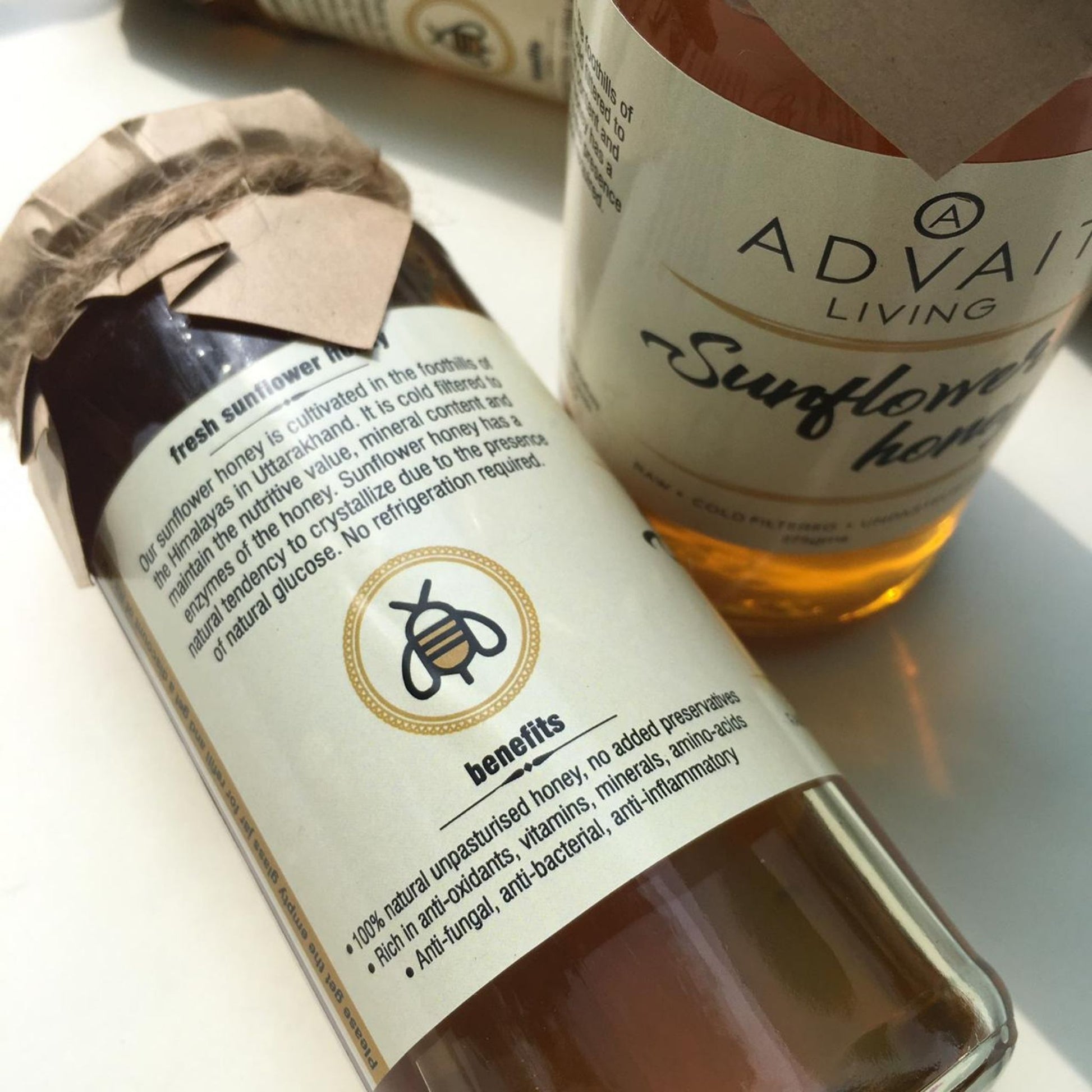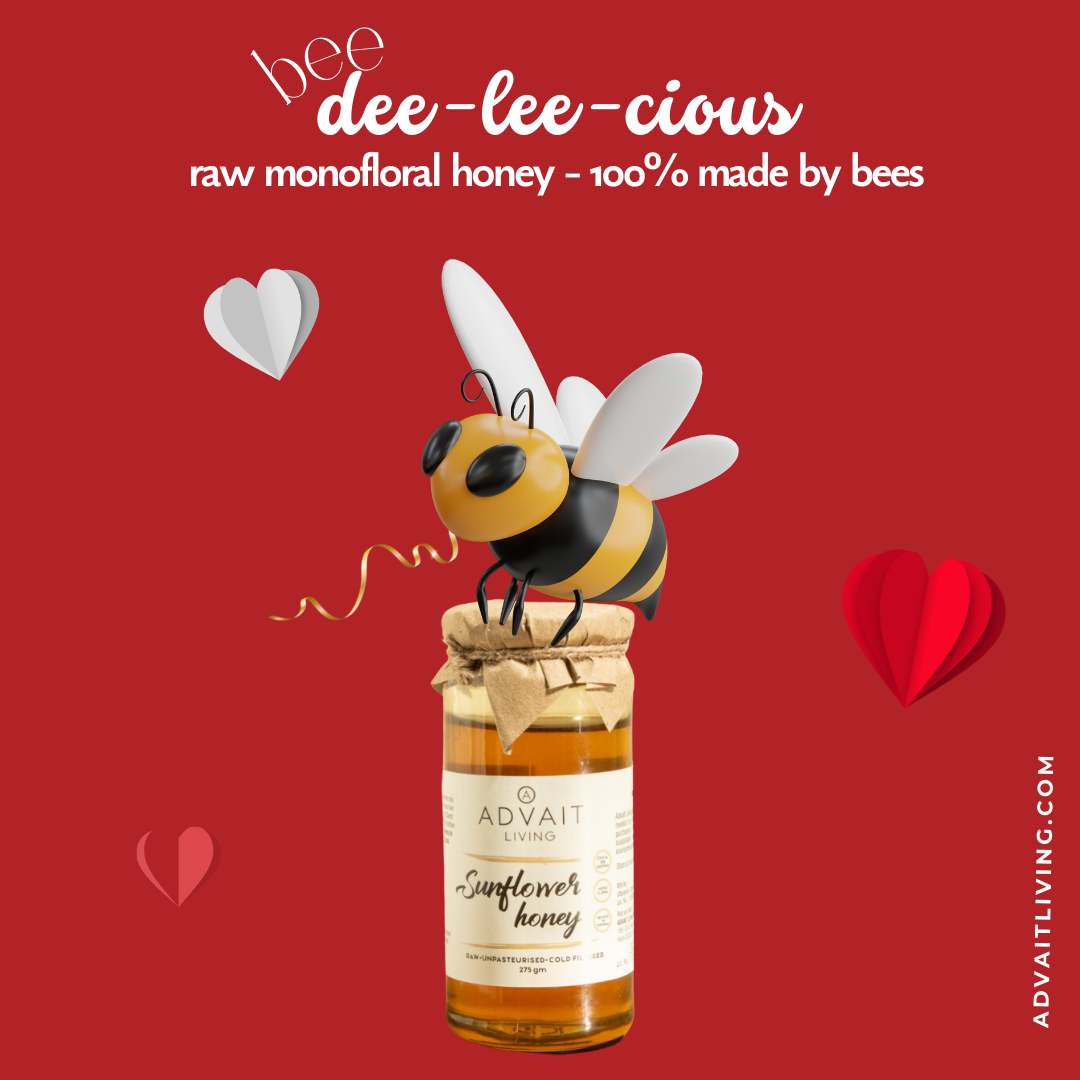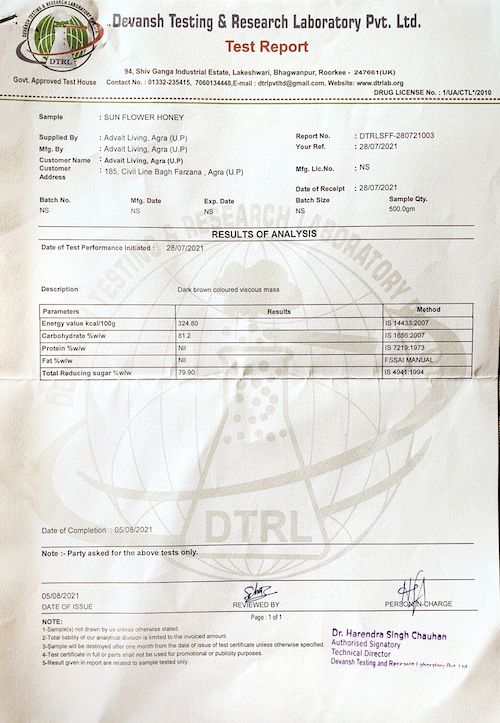Advait Living
Raw Honey | Sunflower | Monofloral | Pure & Unpasteurised | Cold-filtered
Raw Honey | Sunflower | Monofloral | Pure & Unpasteurised | Cold-filtered
Couldn't load pickup availability
 Single Flora Origin
Single Flora Origin
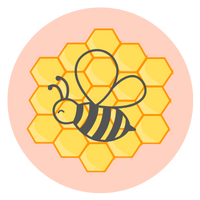 100% from Bees
100% from Bees
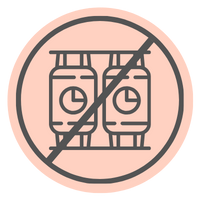 Unpasteurised
Unpasteurised
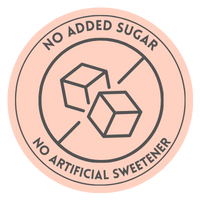 No Added Sugar
No Added Sugar
 Ethical Beekeeping
Ethical Beekeeping
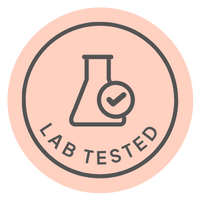 Lab Tested
Lab Tested
Offers
- Avail 5% Discount on orders above Rs 1500. Use Code - ADVAIT5
- Avail 5% Discount & Free Shipping on orders above Rs 2500. Use Code - GOODFOOD
“FLORAL NOT FLAVOURED”
Straight from the bees, 100% pure and raw, experience real honey from Advait Living. This delicious Raw Sunflower Honey is the taste of authentic nature at its best!
Mono-Floral: ‘Mono’ means ‘single’ and ‘floral’ means ‘flower’. Our monofloral honey is a concentrated flower nectar in its original and purest form straight from the bees without any alterations.
Raw Sunflower Honey: Our raw sunflower honey comes from ‘single-flora’ & geographically identifiable fields near Kannauj in Uttar Pradesh, where sunflowers bloom. Every April, our partner micro-beekeepers harvest real honey directly from a bee-box that is kept in the fields of sunflowers, making it ‘असली छत्ते का शहद’. The floral notes are from the flowers and no honey is flavoured! Our honey is never heated. This ensures that each jar of honey is full of its natural minerals, vitamins, pollen & enzymes, making it a 'nectar of the gods'!
Flavour Profile of Raw Sunflower Honey: Delicious, naturally sweet, medium-dense, hint of butterscotch, floral with a hint of tang. Pairs incredibly well with toast, hard cheese, olives, and wine.
Key Features:
- 100% Pure and Raw
- Original floral notes (no added flavours)
- Geographic origin: Kannauj, Uttar Pradesh
- Harvest Season: April-May
- Unprocessed and unpasteurized
- Cold-filtered (no flash-heating), maintaining its natural enzymes, antioxidants, and beneficial compounds
- No additives, preservatives, or added sugars
- Ethical Beekeeping (no bees are harmed)
Crystallisation: Tends to crystallise due to the presence of natural glucose present. Heating and processing of honey destroys the natural crystals present in the honey. Our honey is unprocessed and the crystals prove that the honey is top quality and hasn't been processed.
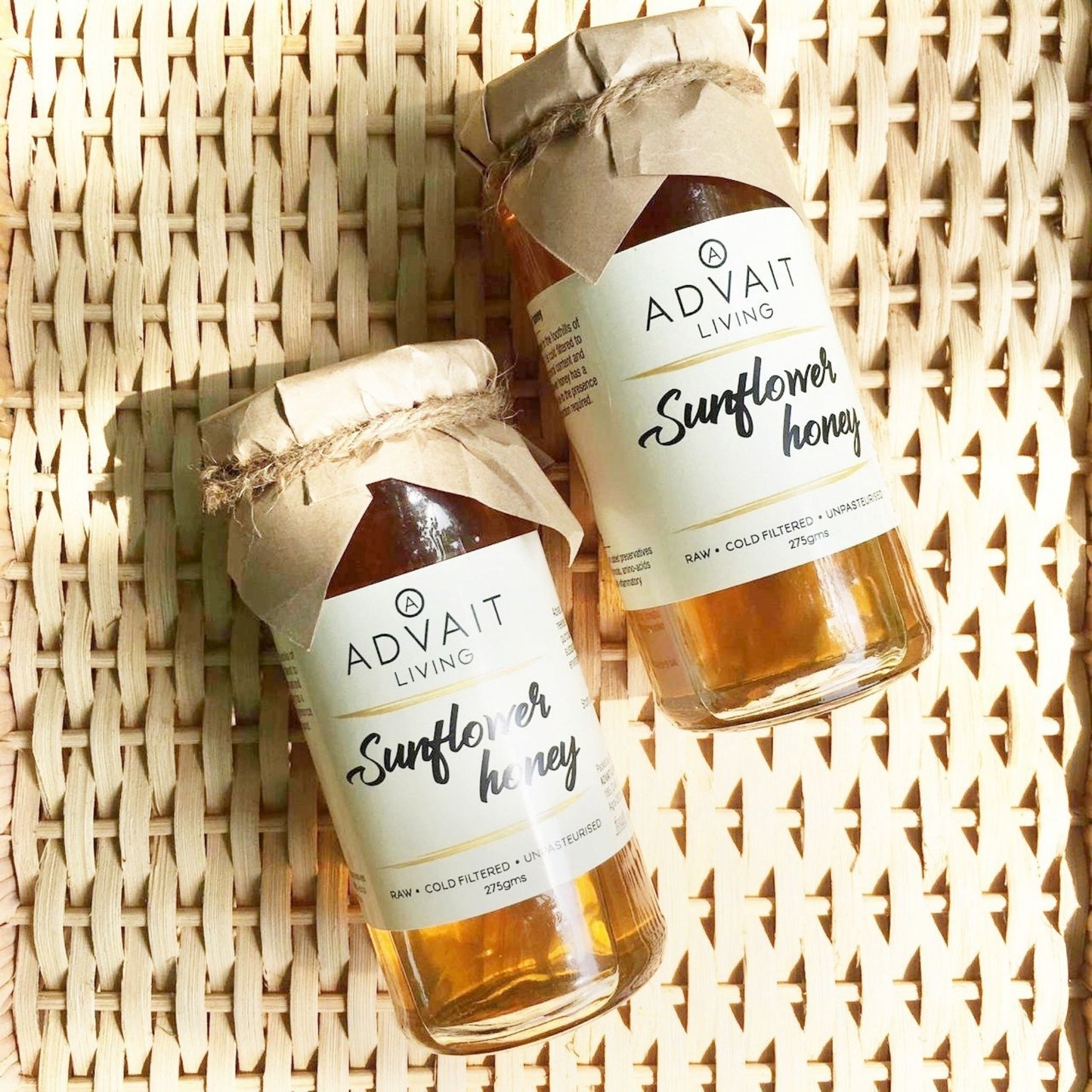
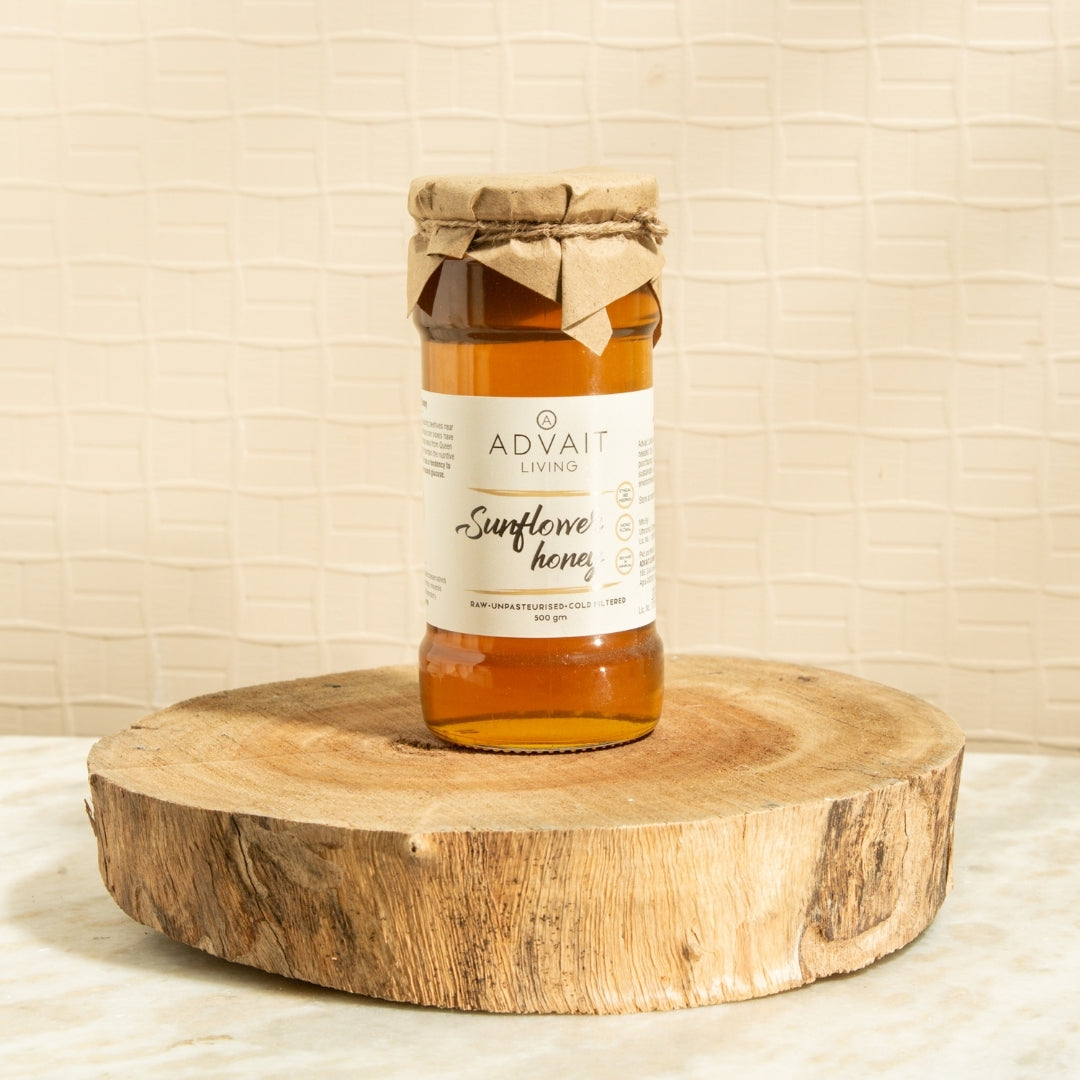
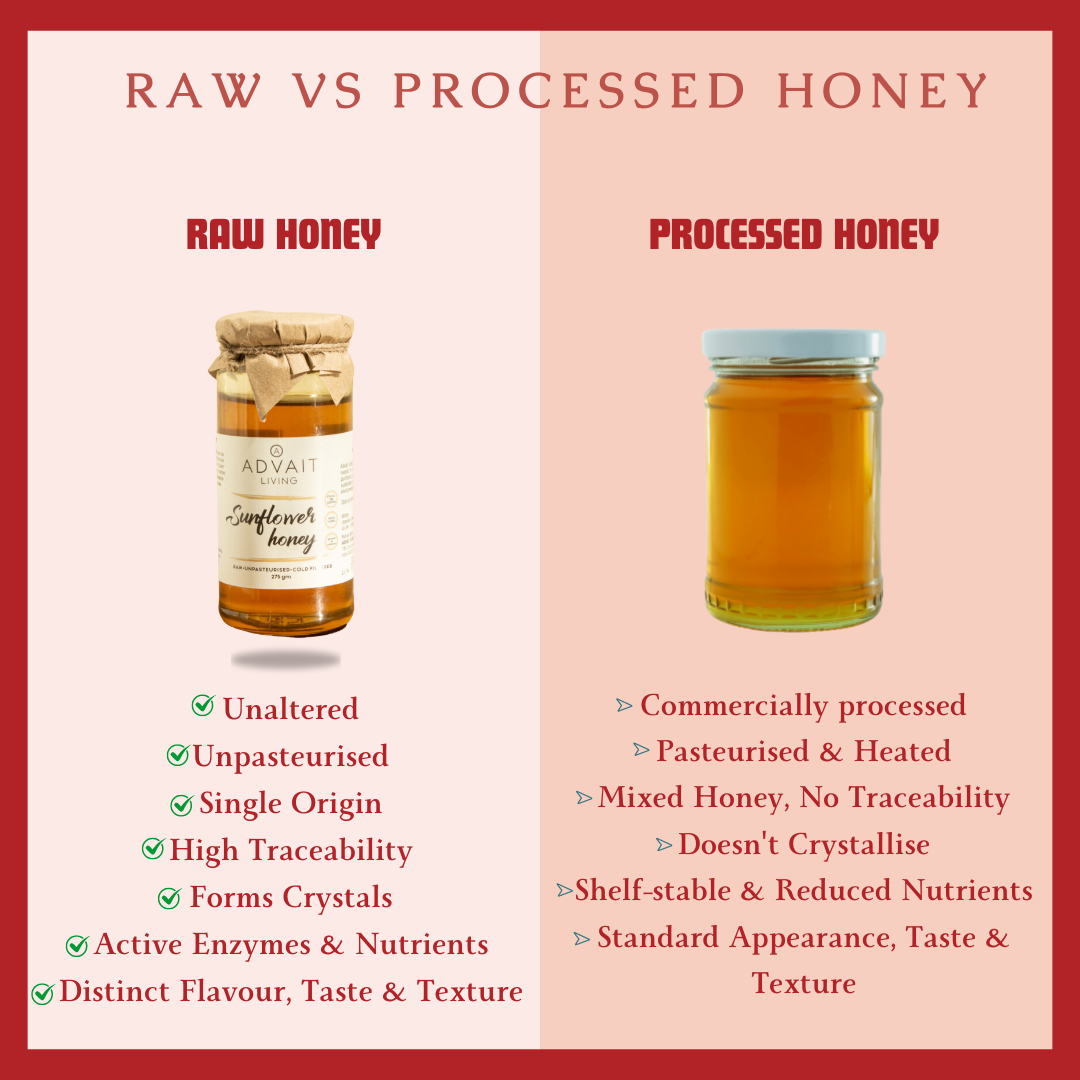
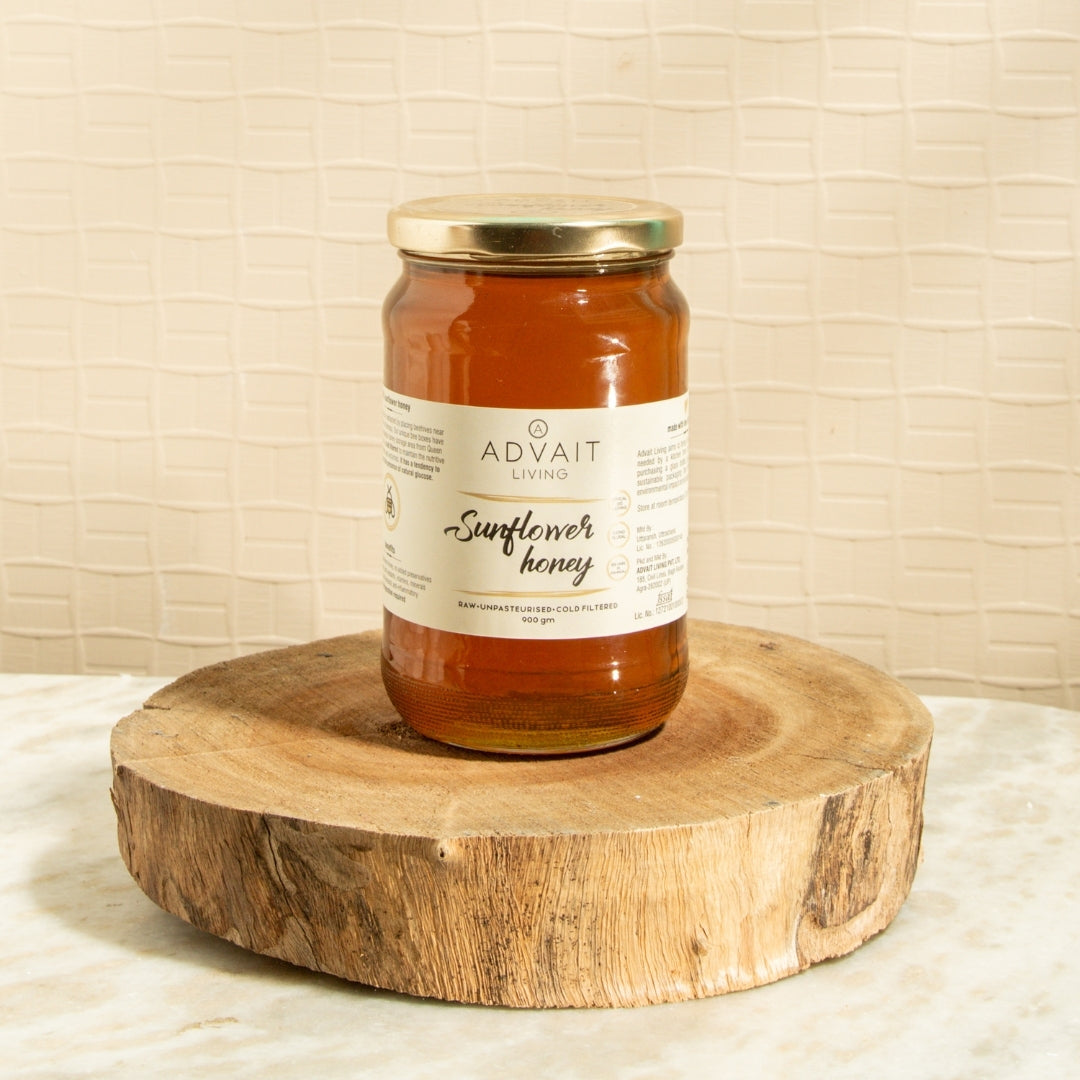
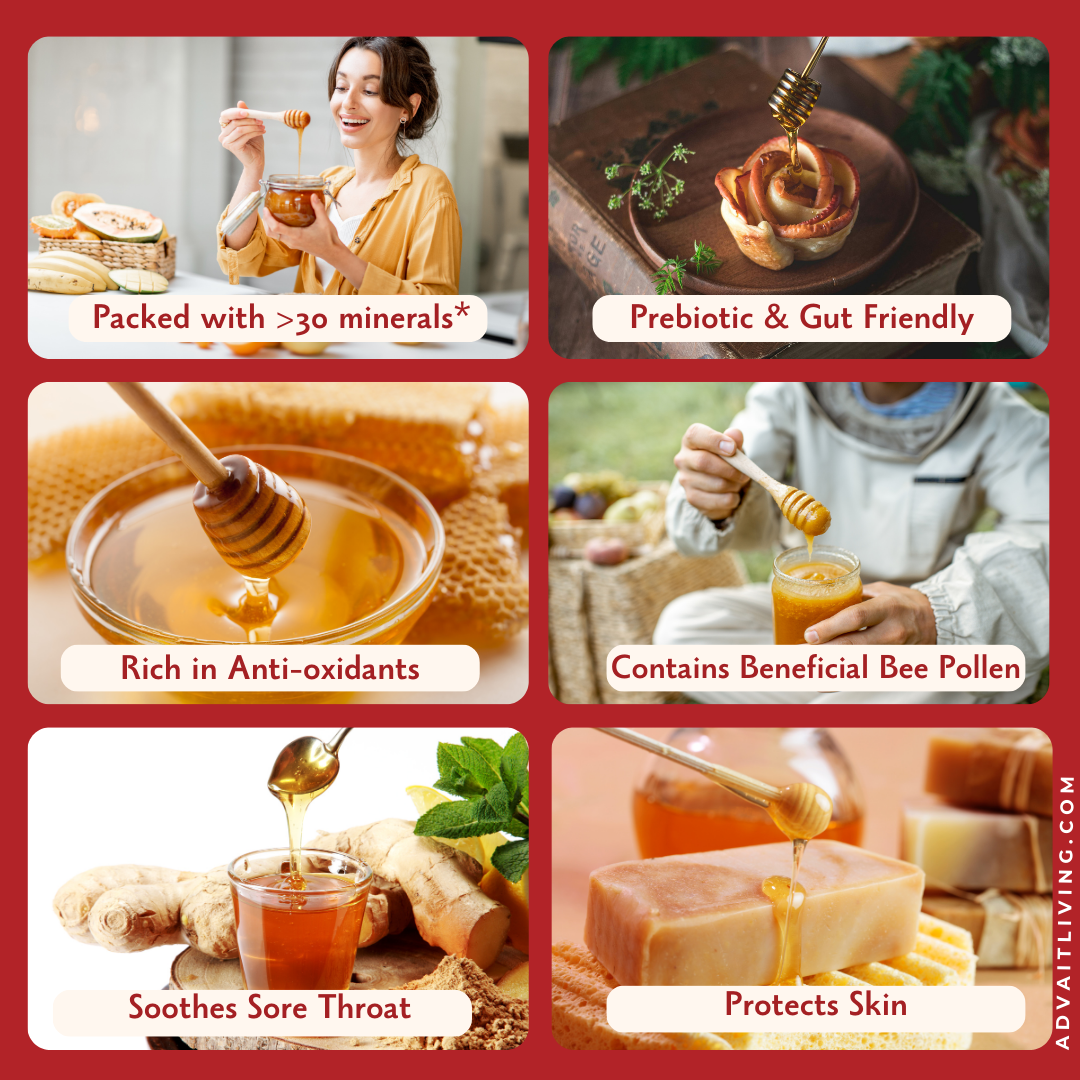
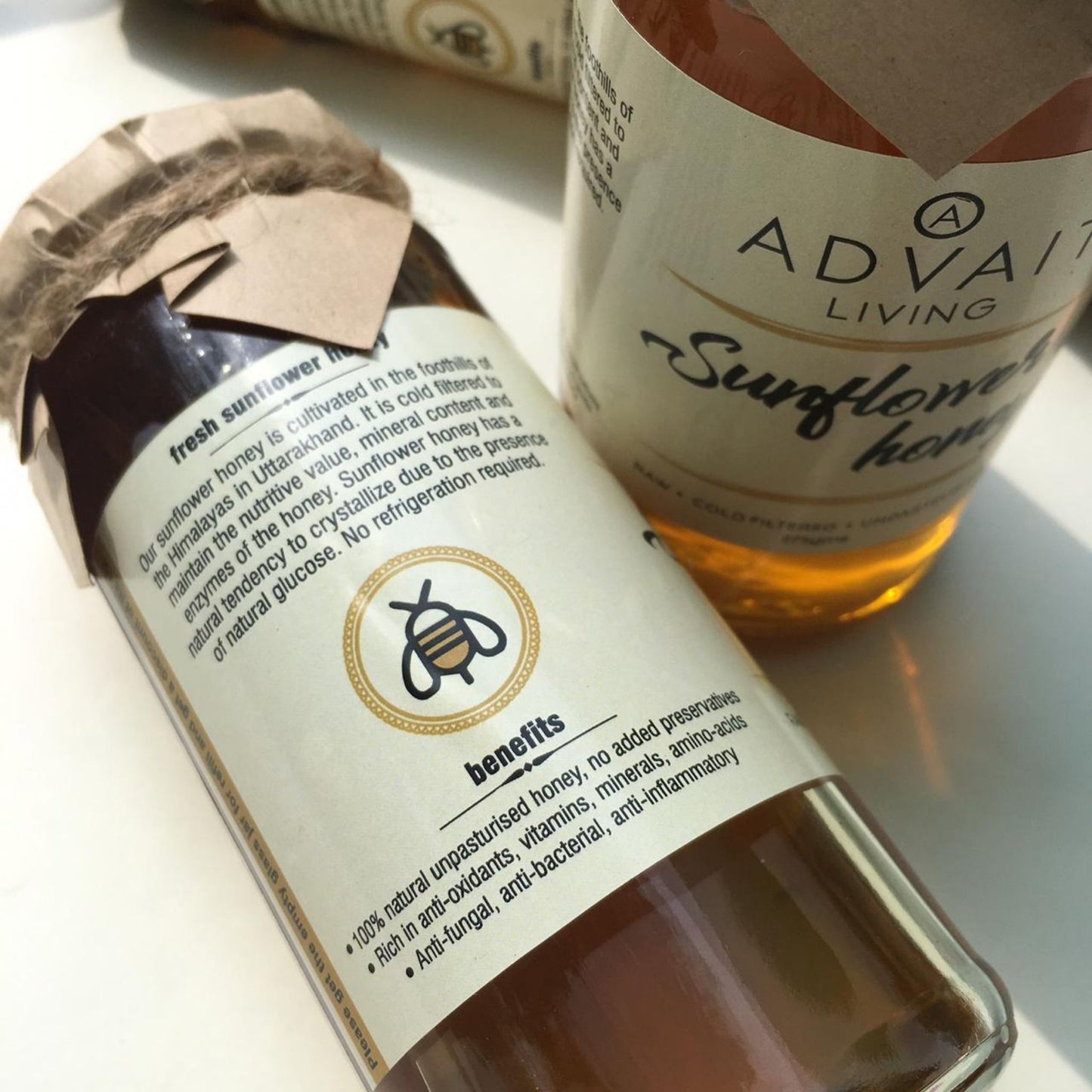
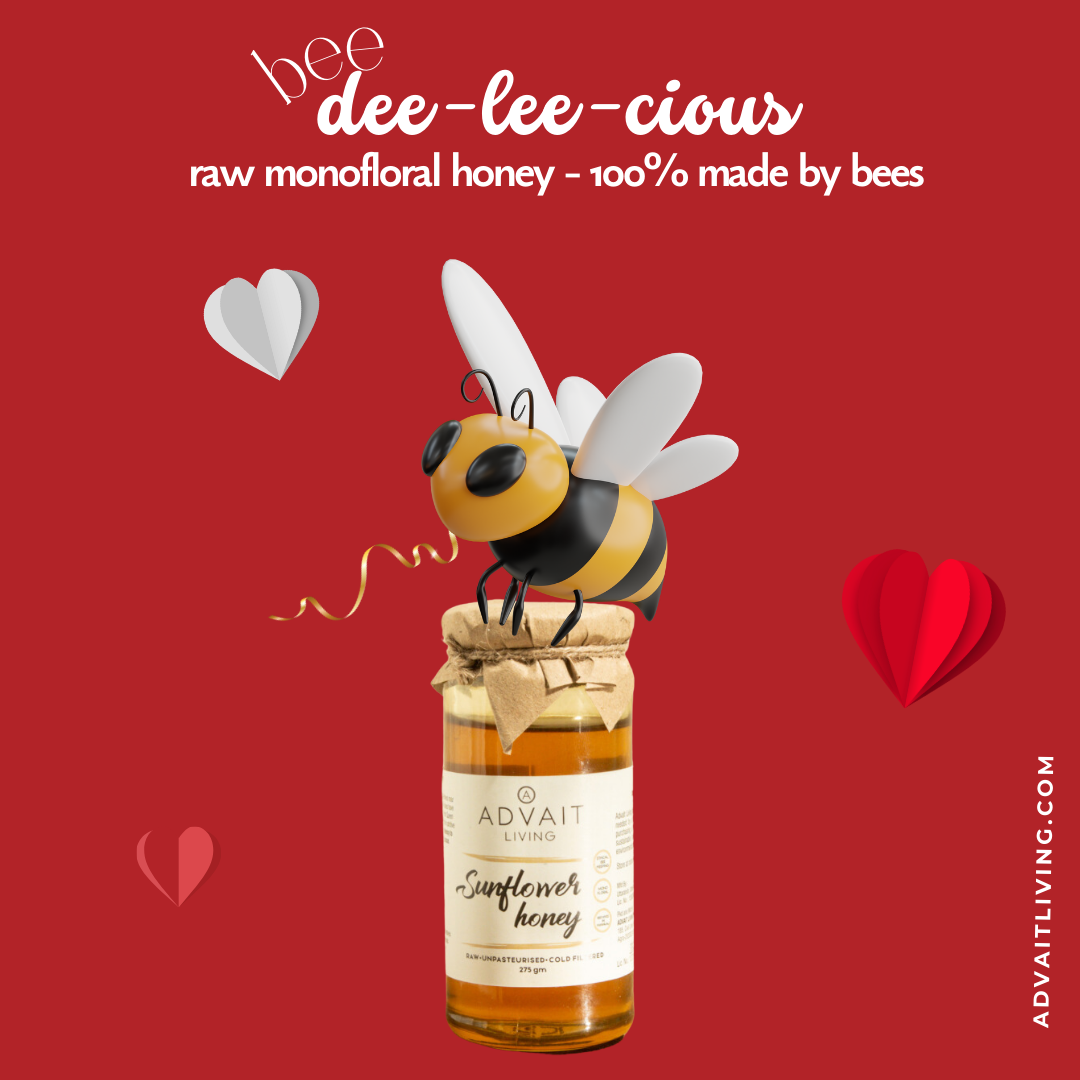
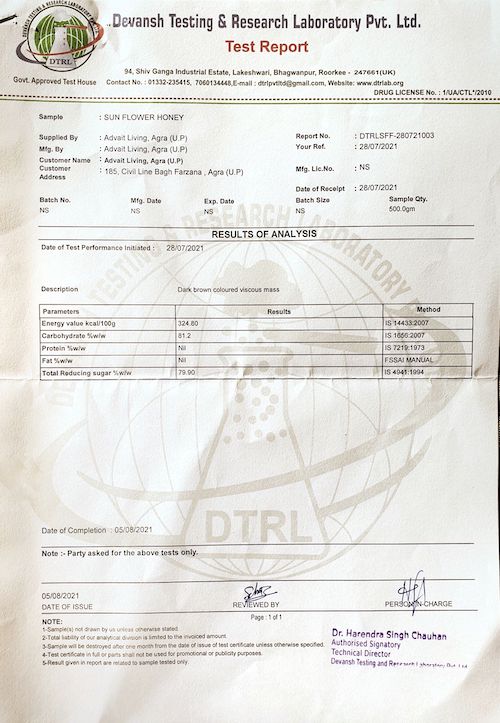
Advait Living's Raw Honey is in a league of its own. Its rich, golden colour and intense flavour make it stand out from other brands. I use it in everything from marinades to desserts.
Sudhir Kumar
I really liked the Sunflower Honey, its naturally sweet and pure. You can see the texture and consistency of this honey to know that it is not adulterated. Also like the fact that it is lab tested! Must buy!
Meetu Singh
This is the best honey I have ever had. The quality of honey is very consistent and reliable. If you buy a regular grocery store honey and taste this side by side, you'll immediately know the difference in quality. Highly recommend it.
Manisha Durlabhji
More Info
Get in-depth insights on our products! Learn more about what makes them special, how they are made, how to use them and more.

Description
Almost 2000 little individual flowers inside the head of the sunflower have to bloom for one sunflower to bloom. Isn't that fascinating? They are well-known for being a happy flower and perfect to brighten someone's mood!
Experience the pure essence of sunflowers with Advait Living’s Raw Sunflower Honey Sunflower honey is a delicious treat and comes directly from the nectar of the sunflowers grown in fields around Kannauj in Uttar Pradesh. It is harvested once a year in April-May when the flowers bloom. Besides its delicious taste, it is also used for stomach-intestine conditions, lung & kidney health, blood circulation and its antimicrobial properties. Raw honey is also good for gut health!
Monofloral Flavour Profile: Pleasant, rich, sweet with floral notes. This luscious liquid is light gold in colour and delicious. It pairs incredibly well with Wine, Feta & All types of herbed cheese as well as dried fruits. Consume directly to eat like a dessert or spread on toast for a delicious and immersive experience. Be sure not to microwave your honey, because the heat will destroy many of your favourite enzymes and vitamins.
Region of Origin: Directly from micro-beekeepers near sunflower fields in Kannauj, Uttar Pradesh
Harvesting Month: April-May
Crystallisation: Tends to crystallise due to the presence of natural glucose present. Heating and processing of honey destroys the natural crystals present in the honey. Our honey is unprocessed and the crystals prove that the honey is quality and hasn't been processed.
What makes it unique:
- Raw Honey: This honey is raw, unprocessed, unpasteurised honey that is as natural as it can get. No sugar or any of its variants is added to the honey. It is directly from the bees.
- Monofloral: Mono=single. Floral=flower. Mono floral honey is a single-flower honey. The term "Sunflower" refers to the floral origin (and not infusions). We do not infuse our honey with any additives or herbs.
- Cold-filtered: Our honey comes directly from micro-beekeepers and is naturally extracted & cold-filtered to remove external impurities. Consequently, it holds all the beneficial immunity-boosting enzymes, antioxidants and minerals. Heating honey, on the other hand, destroys nutrients and Ayurveda strictly prohibits it. Our honey is FLASH-HEATING FREE & PASTURERIZATION-FREE
- Ethical beekeeping: Passionate micro-beekeepers have collected this honey, using bee-boxes that are humane and bee-preserving. No bees are harmed in bee-boxes, rather bees are kept as pets. Holistic and conscious methods are deployed to naturally extract honey that leads to ZERO harm for the bees or the environment.
Choose Advait Living Raw Sunflower Honey for a taste that's as natural as it gets—sweet, floral, and sustainably sourced.
Making Process
Advait Living’s Raw Sunflower Honey is
- Straight from the bees
- Unprocessed & unaltered
- ‘असली छत्ते का शहद’ (comes from modern beehives called ‘bee boxes’)
Ethical Beekeeping
Our beehives are part of the livelihood of the marginal farmers with whom we collaborate. It is not only in our interest but deeply rooted in our ethos, to collaborate with nature in such a way that values all beings equally and with minimal disturbance to flora and fauna. Beekeeping is a nomadic adventure that requires bee hives to migrate season to season to new geographies with enough flora present that ensure bees not only survive but also thrive. Beekeeping requires years of experience and skills to ensure the safety of the bee colonies, especially when the colonies are transported to other geographies. We work with micro-farmers and nomadic beekeepers that have been practising this art for decades.
1. Hive Placement: Our process begins with starting and carefully nurturing bee colonies. We are partnering with handpicked micro-beekeepers in the sunflower-rich region of Kannauj, Uttar Pradesh. Uniquely designed and ethical bee boxes are placed in fields where only sunflowers are in bloom. This placement minimizes the chance of bees foraging on other plants, allowing them to focus on the nectar from the sunflowers only.
2. Ethical Bee Boxes: Selecting and preparing the bee boxes is a crucial step towards humane bee-keeping. Our bee boxes are designed to mimic the bees' natural environment, providing a safe and sustainable habitat. The boxes have a unique design that ensures the safety of the bees and queen bee. No bees are ever harmed either inside the bee-box or outside. The honey collection process is also completely manual after the removal of honey frames from the box to ensure the safety of the bees.
3. Honey Collection: As bees collect nectar from the Sunflower fields, they return to the bee boxes with wooden frames. The bees make their honeycombs in these frames and use them to collect the honey. Once enough honey is produced, the honey collection process begins. A little smoke is used to calm the bees (smoke doesn’t harm the bees as long as it is not too hot. Beekeepers ensure the smoke is not hot to the touch). Once the beekeeper ensures this situation, he removes the wooden frames from the bee boxes. The honey is then manually separated from the wooden frames by employing a centrifugal extractor. All these processes are natural and do not cause any alterations in the properties of raw honey by maintaining the same high level of nutritional value.
4. Cold Filtering: Once the honey is extracted, it is filtered to separate any residual beeswax or debris. We use metal or cheesecloth to cold filter the honey without any flash heating or exposing the honey to high temperatures. This gentle extraction process preserves the natural enzymes, antioxidants, and vitamins in the honey.
Heating, common in many commercial honey production processes, can degrade these beneficial components. The raw sunflower honey is then poured into sterilized glass jars to maintain its freshness. Each batch undergoes rigorous quality checks to ensure it meets our high standards for purity, consistency, and flavour.
5. From Field to Table: Once bottled, Advait Living’s Raw Sunflower Honey is ready to be enjoyed by consumers. Its rich, sweet, and floral flavour profile makes it a versatile addition to various dishes or a delightful treat on its own.
The entire process, from nectar collection to bottling, is designed to create honey that embodies the essence of sunflowers and reflects the dedication of our beekeepers to quality and sustainability.
Sustainable and Ethical Practices: Throughout the process, we prioritise sustainable and ethical practices. Our beekeepers ensure that no bees are harmed during extraction, and the bee boxes are designed to promote bee health and longevity.
Only 70% of the honey is extracted at any given point in time and the balance is left for the bees. This ensures bees are well-fed and no sugar solution is given to the bees. Although pollen is highly priced, we deliberately do not collect it as pollen - a high-protein food, is crucial for bees' overall health.
This commitment to ethical beekeeping aligns with our goal to produce honey that is not only delicious but also environmentally responsible.
Ingredients
100% pure and natural raw honey (and nothing else)!
Shipping
Glass Bottles: Our Raw Sunflower Honey is elegantly housed in high-quality glass bottles. This eco-friendly packaging ensures the preservation of purity, with the added bonus of being reusable. Local customers enjoy discounts on refills, contributing to a sustainable cycle.
Sustainable Packaging: We're committed to sustainability. While our honey orders come in plastic-free packaging, additional items may include bubble wrap for efficient shipping. We encourage you to reuse or return our packaging, reinforcing our dedication to a greener, healthier planet.
How To Use?
Our Monofloral Raw Sunflower Honey is a versatile ingredient with a delightful flavour profile and numerous health benefits. Its natural sweetness and floral notes make it a perfect addition to a variety of dishes. Feel free to experiment with the honey in a variety of ways!
1. Sweetener in Beverages:
Raw sunflower honey can be used to sweeten various beverages while adding subtle floral undertones:
- Chai Tea: Stir a spoonful of honey into your morning chai for a gentle sweetness that complements the spices.
- Lassi: Mix honey with yoghurt to create a sweet lassi, a traditional Indian drink that’s refreshing and nutritious.
- Herbal Teas: Use honey to sweeten herbal teas like tulsi or ginger tea, which adds a touch of flavour without overpowering the natural essence of the herbs.
2. Breakfast and Snack Ideas:
Honey is a popular addition to breakfast items and snacks:
- Toast and Parathas: Spread raw sunflower honey on toasted bread or parathas for a simple yet delightful breakfast or snack.
- Pancakes and Dosas: Drizzle honey over pancakes or dosas for a naturally sweet alternative to syrups.
- Smoothies and Fruit Bowls: Add a tablespoon of honey to fruit smoothies or sprinkle it over fruit bowls for a healthy energy boost.
3. Culinary Uses:
Raw sunflower honey can be used as an ingredient in cooked or baked dishes providing a natural sweetness. It is ideal to use the honey once the dish is cooked and preferable to avoid heating the honey:
- Charcuterie Boards: Raw honey is an excellent accompaniment to cheese on a charcuterie board adding sweeter & floral notes to savory profile.
- Marinades and Sauces: Combine honey with soy sauce, ginger, and garlic for a sweet and savoury marinade. Ideal for chicken or paneer.
- Indian Sweets: Incorporate honey into traditional sweets like kheer, phirni, or besan laddoo. It can replace refined sugar and add depth to the flavour profile.
4. Desserts and Confections:
Honey's sweetness and unique flavour make it an excellent addition to desserts:
- Halwa: Add honey to semolina or carrot halwa for a healthier sweetener option.
- Custards and Yoghurts: Mix honey with custards or yoghurts for a creamy dessert with a natural twist.
- Fruit Desserts: Drizzle honey over baked fruits or use it to caramelise bananas or apples for a simple yet elegant dessert.
5. Health and Wellness:
Raw sunflower honey can also be used for its health benefits:
- Cough Remedy: Mix honey with ginger juice for a natural cough remedy that soothes the throat.
- Immunity Boost: Add honey to warm water with lemon and turmeric to boost immunity and aid digestion.
- Skin Care: Apply a thin layer of honey as a natural face mask to moisturize and cleanse the skin.
Tips for Using Raw Honey:
- Avoid microwaving or heating raw sunflower honey, as this can destroy its beneficial enzymes and vitamins.
- Store honey in a cool, dry place to prevent crystallization or spoilage.
- If honey crystallizes, simply warm the jar in a bowl of hot water until the crystals dissolve.
Incorporating raw sunflower honey into your daily routine and culinary practices adds not only a touch of sweetness but also a depth of flavour and health benefits that refined sugars cannot provide. Enjoy exploring its uses in Indian cuisine and beyond!
FAQ
Have questions? We've got answers! Check out our Frequently Asked Questions section for all the info you need. Find solutions, tips, and more to make your experience smoother.

What is the difference between organic honey and raw honey?
Organic honey focuses on production practices, ensuring the honey is sourced from organic plants and made without synthetic chemicals. Raw honey, meanwhile, emphasises the lack of pasteurization and minimal processing, maintaining its natural composition.
A honey product can be both organic and raw, offering the benefits of organic farming practices while preserving its natural state. However, not all organic honey is raw, and not all raw honey is organic.
When choosing between them, consider your priorities—whether it's organic certification or minimal processing—and check labels for more details on sourcing and processing methods.
Here's the difference between organic honey and raw honey:
Organic Honey
1. Production Standards: Organic honey comes from bee farms that follow specific organic standards, including avoiding synthetic pesticides, herbicides, antibiotics, or genetically modified organisms (GMOs). These standards also apply to the plants from which bees collect nectar.
2. Certifications: To be labelled "organic," honey must be certified by an organic certification body, demonstrating that it meets the required standards for organic farming practices.
3. Environmental Considerations: Organic honey production focuses on environmentally friendly practices, promoting sustainability and biodiversity. Bees are often kept in areas free from pollution and synthetic chemicals.
4. Additives and Processing: Organic honey should contain no added sugars or artificial substances, though it may still be heated or filtered depending on the processing method.
Raw Honey
1. Processing and Treatment: Raw honey is unpasteurized and minimally processed, retaining natural enzymes, antioxidants, and nutrients that might be lost during high-temperature pasteurization or excessive filtering. It often has more texture and may contain traces of pollen and beeswax.
2. Natural State: Raw honey is as close to its natural state as possible, typically extracted from the honeycomb without significant heating or refining. This preserves its natural benefits but can also lead to faster crystallization.
3. Certifications: Raw honey does not require specific certifications, but the term implies minimal processing and absence of pasteurization. It doesn't necessarily mean the honey is organic.
4. Health Benefits: Because it's minimally processed, raw honey is valued for its health benefits, including antimicrobial properties and enzymes that aid digestion and support immunity.
How do I know if the honey I buy is pure?
Knowing if the honey you buy is pure involves checking for certain characteristics and avoiding common signs of adulteration.
Pure honey is unadulterated and contains no added sugars, corn syrup, or artificial substances. Here's how to determine whether the honey you buy is pure:
1. Examine the Label
Ingredient List: Check the ingredient list for any added sugars or sweeteners. Pure honey should list only "honey" as the ingredient.
Labe Test Reports: Look for Lab test results that the manufacturer makes available to check for heavy metals, added sugars, nutritional labels, or any international test results. These indicate that the honey has met certain purity standards.
Description: Labels like "raw," "unpasteurized," "unfiltered," or "100% pure" often indicate higher quality, though they don't guarantee purity.
2. Observe the Honey's Appearance
Crystallization: Pure honey often crystallizes over time due to its natural sugar content. If the honey has started to crystallize, it's a good sign of purity.
Clarity and Colour: Pure honey can vary in colour and may contain natural impurities like pollen or small pieces of beeswax. Honey that is too clear and lacks texture might have been heavily processed.
3. Perform a Water Test
Dissolution: Place a small amount of honey in a glass of water. Pure honey should sink to the bottom and not dissolve immediately. Adulterated honey often dissolves or spreads quickly.
Layering: If you pour honey into a glass of water and it remains distinct, it indicates a higher density typical of pure honey.
4. Check for Stickiness
Rub a small amount of honey between your fingers and then rinse with water. Pure honey should leave a minimal sticky residue after washing off. Adulterated honey with added sugars often leaves a sticky film.
5. Smell and Taste
Aroma: Pure honey has a natural, floral aroma. Adulterated honey may lack a strong scent or have an artificial smell.
Taste: Pure honey has a complex flavour profile with subtle variations depending on its source. Adulterated honey might taste excessively sweet or lack depth.
6. Know Your Source
Reputable Producers: Buy honey from reputable brands or directly from local beekeepers with a good reputation. This reduces the risk of buying adulterated honey.
Transparent Practices: Trustworthy producers often share information about their beekeeping practices and how their honey is processed.
7. Check for Common Additives
Corn Syrup: Adulterated honey may contain corn syrup or other cheap sweeteners. While difficult to detect without laboratory tests, checking for certifications and reputable sources helps avoid this risk.
Artificial Flavours or Colours: Pure honey does not contain artificial flavours or colours. Avoid honey with unusually vibrant colours or overly intense flavours.
By following these tips, you can increase the likelihood of purchasing pure honey. Remember that even pure honey can have variations in colour and texture depending on its source, so these characteristics alone don't indicate impurity.
What are the benefits of honey and ginger for coughs?
Honey and ginger have been used as natural remedies for coughs for centuries, valued for their soothing and therapeutic properties. The benefits of honey and ginger for coughs stem from their soothing, antimicrobial, anti-inflammatory, and immune-boosting properties. They work together to reduce cough severity, promote mucus clearance, and provide comfort during illness.
However, if symptoms persist or are severe, it's essential to consult a healthcare professional for proper diagnosis and treatment.
Please note that honey should not be given to children under one year due to the risk of botulism.
Here are the benefits of taking honey with ginger for coughs:
1. Soothes Sore Throats
Honey has a viscous texture that coats the throat, providing a soothing effect and reducing irritation. This can be especially helpful for dry or scratchy throats associated with coughing.
2. Antimicrobial Properties
Honey contains natural antimicrobial compounds, which can help reduce the presence of bacteria and viruses in the throat, potentially shortening the duration of a cough caused by infection.
3. Anti-Inflammatory Effects
Ginger contains bioactive compounds like gingerol, which have anti-inflammatory properties. This can help reduce inflammation in the respiratory tract, alleviating cough and related discomfort.
4. Promotes Mucus Clearance
Ginger is known for its ability to promote mucus clearance from the respiratory system. It can help break down mucus and facilitate its expulsion, providing relief from congestion and cough.
5. Boosts Immunity
Both honey and ginger can boost the immune system. Honey's antioxidants and ginger's bioactive compounds work together to strengthen the body's defences against infections, which can be beneficial in preventing and fighting respiratory illnesses.
6. Natural Cough Suppressant
Honey has been shown to be as effective as some over-the-counter cough suppressants in reducing cough frequency and severity. This is especially valuable for managing nighttime coughs, which can disrupt sleep.
7. Relieves Nausea and Indigestion
Ginger is known for its ability to relieve nausea and indigestion, which can be secondary symptoms associated with respiratory infections. This makes honey and ginger a well-rounded remedy for multiple symptoms.
8. Calming and Comforting
The combination of honey and ginger in a warm beverage can have a calming effect, providing comfort during illness. It can also promote relaxation and improve sleep, which is crucial for recovery.
9. Versatile and Easy to Use
Honey and ginger can be used in various ways to treat coughs. They can be mixed into tea, hot water, or even taken directly by the spoonful. This versatility makes them accessible and easy to incorporate into a daily routine.
Is honey safe for diabetics?
Honey is a natural sweetener that contains a mix of sugars, primarily glucose and fructose, along with small amounts of vitamins, minerals, and antioxidants. While it is generally considered healthier than refined sugar, the question of whether honey is safe for diabetics requires careful consideration.
Here's what you need to know:
1. Impact on Blood Sugar
Honey has a glycemic index (GI) ranging from about 30 to 70, depending on the type of honey and its source. This means it can cause a rise in blood sugar levels when consumed, but the impact might be slightly less pronounced compared to refined sugar, which has a higher GI. For diabetics, maintaining stable blood sugar levels is crucial, so any sweetener, including honey, should be used cautiously.
2. Moderation is Key
For people with diabetes, moderation is essential when consuming honey. While it contains beneficial nutrients and antioxidants, it still contributes to carbohydrate intake. Diabetics need to monitor their carbohydrate consumption to manage blood sugar levels, so even small amounts of honey should be factored into the daily carb count.
3. Consultation with Healthcare Professionals
If you have diabetes, it's crucial to consult with a healthcare provider or a registered dietitian before incorporating honey into your diet. They can help determine how much honey, if any, is safe for you to consume based on your individual health needs and medication regimen.
4. Use as a Substitute
Some people with diabetes use honey as a substitute for refined sugar, believing it to be a more natural and potentially healthier option. While honey may offer some advantages over refined sugar, it's important to remember that it is still a form of sugar and should be consumed in moderation.
5. Potential Health Benefits
Honey contains antioxidants, which may have health benefits beyond sweetening. However, these benefits do not negate the impact of honey on blood sugar levels, so any potential health advantages should be weighed against the risks for diabetics.
Tips for Diabetic-Friendly Honey Use:
- Measure Carefully: Use a measuring spoon to control portions and avoid excessive consumption.
- Pair with Other Foods: Consuming honey with high-fibre foods or protein can help slow its absorption and reduce blood sugar spikes.
- Choose Raw Honey: Raw honey may offer additional nutrients and enzymes that are lost in processed honey, but it does not change its sugar content or impact blood sugar.
- Monitor Blood Sugar Levels: Regular monitoring can help you understand how honey affects your blood sugar and whether adjustments are needed.
Honey can be part of a diabetic's diet when consumed in moderation and with careful monitoring of blood sugar levels. However, it should not be seen as a "safe" alternative to sugar for diabetics without professional guidance.
Always consult with a healthcare provider to ensure that including honey in your diet aligns with your diabetes management plan.
What are the primary health benefits of consuming raw honey compared to processed honey?
Raw honey is often regarded as healthier than processed honey due to its minimal processing and retention of natural nutrients. Here are the primary health benefits of consuming raw honey compared to processed honey:
1. Rich in Antioxidants
Raw honey contains a higher concentration of antioxidants, including flavonoids and phenolic compounds. These antioxidants help combat oxidative stress and may reduce the risk of chronic diseases such as heart disease and certain types of cancer.
2. Natural Enzymes
Raw honey retains natural enzymes like diastase, invertase, and glucose oxidase, which are typically lost during the pasteurization process in processed honey. These enzymes can aid digestion and enhance honey's antimicrobial properties.
3. Antibacterial and Antimicrobial Properties
Raw honey has strong antibacterial and antimicrobial properties due to its natural enzymes and low water content. It can inhibit the growth of harmful bacteria, making it useful for wound healing, soothing sore throats, and relieving coughs.
4. Nutrient Retention
Unlike processed honey, which is often heated to high temperatures, raw honey preserves vitamins and minerals such as vitamin C, B vitamins, iron, and potassium. These nutrients contribute to the overall health benefits of raw honey.
5. Supports Digestive Health
Raw honey contains prebiotics, which support the growth of beneficial gut bacteria. The enzymes and natural sugars in raw honey can aid digestion and promote a healthy gut microbiome.
6. Anti-Inflammatory Effects
The antioxidants and bioactive compounds in raw honey have anti-inflammatory effects, which may help reduce inflammation in the body and alleviate symptoms of inflammatory conditions.
7. Immune System Support
The natural antioxidants and antimicrobial properties of raw honey can support the immune system, helping to ward off infections and boost overall immunity.
8. Energy Source
Raw honey is a natural source of energy, providing a quick boost without causing the rapid spikes and crashes associated with refined sugars. It is a preferred energy source for athletes and active individuals.
9. Improved Wound Healing
Raw honey has been used for centuries as a natural remedy for wound healing. Its antibacterial properties, combined with its ability to create a moist environment, can accelerate tissue regeneration and reduce the risk of infection.
10. Reduced Risk of Adulteration
Raw honey is less likely to be adulterated with additives or artificial sweeteners, a common problem with some processed honey. This reduces the risk of consuming potentially harmful substances.
In summary,
Consuming raw honey offers several health benefits compared to processed honey. Its rich antioxidant content, natural enzymes, antibacterial properties, and nutrient retention make it a valuable addition to a healthy diet. However, raw honey should not be given to infants under one year due to the risk of infant botulism. Additionally, while raw honey can be beneficial, it should be consumed in moderation as it still contains sugars.
How is raw honey used in traditional medicine such as Ayurveda or home remedies?
Raw honey has a rich history in traditional medicine, especially in Ayurveda, where it is valued for its medicinal properties. It is used in various home remedies to promote health and treat common ailments.
Here's how raw honey is used in traditional medicine and home remedies:
1. Ayurvedic Practices
In Ayurveda, raw honey (known as "Madhu") is considered a versatile and potent remedy. It is believed to have both cooling and heating properties, depending on how it is used. Some common Ayurvedic applications include:
- Anupana (Carrier Substance): Raw honey is used as an anupana, a carrier for other herbal medicines, enhancing their absorption and effects.
- Tridosha Balance: Ayurveda classifies individuals into three doshas (Vata, Pitta, Kapha). Honey is said to help balance all three doshas, making it a versatile ingredient in various Ayurvedic treatments.
- Detoxification: Raw honey is used in cleansing and detoxification practices, such as the traditional Panchakarma therapy.
2. Cough and Cold Remedies
Raw honey is a popular home remedy for soothing coughs and sore throats. Its viscous texture coats the throat, providing relief from irritation, while its antibacterial properties can help combat infections. It is often mixed with warm water, lemon, or ginger to create a soothing drink.
3. Digestive Health
Raw honey is used to aid digestion and relieve digestive issues like indigestion and constipation. Its natural enzymes help break down food, promoting better nutrient absorption. In Ayurveda, honey is sometimes combined with herbal remedies to support digestion and improve gut health.
4. Wound Healing and Skin Care
Raw honey has antimicrobial properties, making it useful for wound healing. It can be applied topically to minor cuts and burns to promote healing and reduce the risk of infection. Additionally, raw honey is used in homemade face masks and skin treatments to moisturise and cleanse the skin.
5. Immune System Support
The antioxidants and natural enzymes in raw honey are believed to support the immune system. In traditional medicine, honey is used to boost overall immunity and ward off illnesses. It is often mixed with turmeric or other herbs known for their immune-boosting properties.
6. Energy and Stamina
Raw honey is considered a natural energy source due to its simple sugars, which are easily absorbed by the body. It is used in traditional practices to boost energy and stamina, making it a common ingredient in pre- and post-exercise drinks or snacks.
Is raw honey safe for infants and young children?
Raw honey is not considered safe for infants under one year old due to the risk of infant botulism, a rare but potentially life-threatening illness caused by Clostridium botulinum spores that can be present in honey. However, traditional and cultural practices include a very tiny amount of honey being given to infants. If you are following any traditional practices, just ensure you give a very very small amount of honey to your infant to check his reaction to honey. It is best to start honey for children above one year of age.
For children over one year, raw honey is generally safe to consume in moderation. At this age, the digestive system is more developed. However, parents should be mindful of the sugar content in honey, ensuring that it's consumed as part of a balanced diet.
If you are unsure about introducing honey to young children, it's best to consult with a paediatrician or healthcare provider. They can guide you on when it's safe to introduce honey into your child's diet and how to do so in a way that aligns with their nutritional needs and health safety.
What is the shelf life of Advait Living Raw Sunflower Honey?
Raw honey has the remarkable ability to resist spoilage due to its low moisture content and natural antibacterial properties. It can be kept for years together if stored properly. However, at Advait Living, we suggest a shelf life of raw honey to be around 24 months. This duration represents the time during which the honey will maintain its optimal flavour, texture, and nutritional properties. After this time period, the honey’s consistency, appearance and taste may change.
Tips To Store Raw Honey Properly:
To ensure your raw honey stays fresh and retains its quality throughout its shelf life, follow these storage tips:
1. Keep It in a Cool, Dry Place:
Store your raw honey in a location that is cool and dry, with consistent temperature and humidity levels. Ideal places include a kitchen pantry or a cupboard. Avoid storing honey near heat sources such as stoves, ovens, or direct sunlight, as high temperatures can degrade its flavour and beneficial enzymes.
2. Avoid Refrigeration:
Refrigerating honey is not recommended, as it can cause it to crystallize more quickly. While crystallization is not harmful, it can affect the honey's texture. If crystallization does occur, you can gently warm the honey to dissolve the crystals.
3. Use an Airtight Container:
Ensure that your honey is stored in an airtight container to prevent moisture and contaminants from entering. This helps maintain the honey's natural stability and prevents fermentation, which can occur if excess moisture gets in.
4. Monitor for Changes:
Over time, raw honey may change in texture or colour. These changes are generally natural and do not indicate spoilage. If you notice significant changes, such as fermentation (bubbling or sour smell), discard the honey, as it may have been contaminated.
By storing Advait Living Raw Sunflower Honey properly, you can ensure it remains fresh and retains its quality even after the 24-month period. Follow these storage tips to prevent spoilage and enjoy the benefits of raw honey for as long as possible. If crystallization occurs, gently warm the honey to restore its smooth texture, and always avoid microwaving to preserve its beneficial properties.
What is the price of 500gm honey?
The price of 500 gm raw honey is Rs 520 at Advait Living.
What are the different types of honey available?
Honey comes in a variety of types, each with unique characteristics based on the source of nectar, region, and production methods. Here's a comprehensive list of different types of honey, from different parts of India:
1. Ajwain Honey
Ajwain honey is sourced from ajwain (carom) plants. It has a strong, aromatic flavour and is used for its therapeutic properties, including digestive benefits.
2. Sunflower Honey
Sunflower honey is derived from sunflower fields. It has a light golden colour and a pleasant, sweet flavour with floral undertones.
3. Acacia Honey
Acacia honey is derived from the nectar of acacia trees (often black locust or false acacia). It has a light colour and mild flavour, and is slow to crystallize, making it a popular choice for its versatility.
4. Mustard Honey
Mustard honey comes from mustard farms that are abundant in Uttar Pradesh, Rajasthan, Punjab and Bihar. This honey tends to naturally crystallizes due to its high glucose ratio and high enzyme & pollen count. It is mostly whitish in appearance and has a sweet and spicy flavour.
5. Tulsi Honey
Tulsi (holy basil) honey is a unique Indian variety derived from tulsi plants. It has a distinctive flavour with herbal notes and is valued for its potential health benefits.
6. Jamun Honey
Jamun honey is derived from the jamun (Indian blackberry) tree. It has a deep colour and a rich, slightly tangy flavour. This variety is popular in India and is associated with potential health benefits, especially for diabetics.
7. Neem Honey
Neem honey comes from the neem tree, a medicinal plant in India. It has a strong, slightly bitter flavour and is valued for its antibacterial and anti-inflammatory properties.
8. Multifloral Honey
Multifloral honey is produced from a variety of flower sources, resulting in a diverse flavour profile and colour range. It can be sourced from different regions, offering unique tastes depending on the blend of flowers.
9. Forest Honey
Forest honey is collected from forested areas where bees gather nectar from various trees and plants. It typically has a darker colour and a robust, earthy flavour.
These different types of honey offer a diverse range of flavours, colours, and health benefits. The choice of honey depends on personal preference and intended use, whether for culinary applications, health benefits, or as a natural sweetener.
What are the environmental and sustainability benefits of sourcing raw honey from ethical beekeepers?
Sourcing raw honey from ethical beekeepers has significant environmental and sustainability benefits. Ethical beekeeping practices prioritize the well-being of bees and the ecosystems in which they live, promoting a harmonious relationship between beekeeping and the environment.
Here are the key environmental and sustainability benefits:
1. Promotes Pollination and Biodiversity
Ethical beekeepers prioritise the health and happiness of their bee colonies, which in turn promotes effective pollination. Bees play a crucial role in pollinating plants, trees, and crops. By sourcing honey from ethical beekeepers, you support healthy bee populations, which contributes to increased biodiversity and thriving ecosystems.
2. Avoids Harmful Chemicals
Ethical beekeepers avoid using harmful chemicals, such as synthetic pesticides and antibiotics, that can damage bee colonies and surrounding ecosystems. This practice reduces environmental contamination and ensures that honey is free from chemical residues.
3. Supports Bee Health and Survival
Bees are facing multiple threats, including habitat loss, climate change, and diseases. Ethical beekeepers implement practices that support bee health, such as providing adequate food sources, avoiding stress on colonies, and ensuring bees have suitable habitats. This approach helps to counteract the decline of bee populations and is crucial for sustaining natural ecosystems.
4. Minimizes Environmental Impact
Ethical beekeepers often use environmentally friendly methods to manage their bee farms. This can include sustainable beekeeping equipment, organic farming practices, and reducing waste. These practices help minimise the environmental impact of beekeeping.
5. Promotes Local and Small-Scale Production
Many ethical beekeepers are small-scale, local producers. By supporting them, you contribute to a more sustainable and localised food system. This approach reduces the carbon footprint associated with large-scale industrial beekeeping and long-distance transportation of honey.
6. Contributes to Regenerative Agriculture
Ethical beekeepers often work in conjunction with regenerative agriculture practices. This approach aims to restore and enhance soil health, promote water conservation, and increase biodiversity. Bees are an integral part of this system, and ethical beekeeping contributes to a more sustainable form of agriculture.
7. Educates and Raises Awareness
Ethical beekeepers are often involved in community education and awareness programs about the importance of bees and sustainable practices. This education can inspire more people to support sustainable practices and contribute to broader environmental benefits.
By choosing honey from ethical sources, consumers can support a more sustainable and eco-friendly beekeeping industry while enjoying the benefits of raw honey.
Who should avoid raw honey?
While raw honey offers many health benefits, there are certain groups of people who should avoid it due to potential risks. Here's a list of people who should avoid consuming raw honey and the reasons why:
1. Infants Under One Year
Raw honey should never be given to infants under one year old due to the risk of infant botulism. Botulism is a rare but serious illness caused by Clostridium botulinum spores, which can be found in honey. The immature digestive systems of infants lack the necessary acidity to neutralise these spores, potentially leading to paralysis and other severe symptoms.
2. People with Allergies to Bee Products
Individuals who are allergic to bee stings, bee pollen, or other bee-related products should avoid raw honey, as it may contain traces of pollen or bee parts. Allergic reactions can range from mild symptoms, like itching and hives, to severe anaphylaxis.
3. Individuals with Pollen Allergies
While some people with pollen allergies may tolerate raw honey, others might experience allergic reactions due to the small amounts of pollen it contains. If you have pollen allergies, consult with a healthcare provider before consuming raw honey.
4. Diabetics or People with Blood Sugar Issues
Raw honey contains natural sugars, primarily glucose and fructose, which can raise blood sugar levels. Diabetics or people with other blood sugar concerns should use raw honey cautiously and consult with a healthcare provider or registered dietitian to understand how it fits into their diet.
5. People with Compromised Immune Systems
Individuals with weakened immune systems due to medical conditions or treatments, such as chemotherapy or immunosuppressive therapy, should avoid raw honey to minimise the risk of infections or complications. Raw honey has natural antibacterial properties but may also contain microorganisms that could pose a risk to those with reduced immunity.
6. People Following a Strict Vegan Diet
Raw honey is derived from bees, which makes it unsuitable for strict vegans who avoid all animal-derived products. If you're following a vegan diet, consider alternatives like maple syrup or agave nectar.
Raw honey can be a healthy and beneficial addition to many people's diets, but certain groups should avoid it due to specific risks. If you fall into any of the above categories, it's crucial to consult with a healthcare provider before consuming raw honey to ensure it's safe for you.
Very tasty and natural. I like it.
Love the quality
A thousand times better than Dabur and in fact better than all the other organic brands available. It was my third bottle. No sugar residue, so very pure. Love the taste especially in milk, curd and on bread.
Advait Living's Raw Honey is in a league of its own. Its rich, golden colour and intense flavour make it stand out from other brands. I use it in everything from marinades to desserts.
This honey is a great sweetener for making healthy sweets, oat bowls, and teas. It's organic, tasty, and rich in flavor. Sometimes, I eat it right out of the jar, and it instantly makes me happy. __
Blogs
View all-

Discover the Science-Backed Health Benefits of ...
Raw honey isn't just a natural sweetener—it's packed with a lot of antioxidants, enzymes, and nutrients. Discover the science behind why raw honey deserves a spot in your daily routine.
Discover the Science-Backed Health Benefits of ...
Raw honey isn't just a natural sweetener—it's packed with a lot of antioxidants, enzymes, and nutrients. Discover the science behind why raw honey deserves a spot in your daily routine.
-

The Science Behind Crystallisation of Honey
Crystallised honey isn’t spoiled—it’s a sign of purity! Learn the fascinating science that makes raw honey solidify.
The Science Behind Crystallisation of Honey
Crystallised honey isn’t spoiled—it’s a sign of purity! Learn the fascinating science that makes raw honey solidify.
-

Which Honey is Better? Raw Honey vs Processed H...
Raw or processed honey? Discover the real winner in the honey aisle and how your choice impacts health and nutrition.
Which Honey is Better? Raw Honey vs Processed H...
Raw or processed honey? Discover the real winner in the honey aisle and how your choice impacts health and nutrition.
Advait Living Raw Sunflower Honey
Indulge in the golden goodness of Advait Living Raw Sunflower Honey, where nature's sweetness meets the vibrant energy of sunflower blossoms.
Why is Advait Living’s Raw Sunflower Honey Better?
Harvested from the lush sunflower fields of Uttar Pradesh during the prime harvesting months of April and May, our honey captures the purest essence of sunflowers, offering a unique monofloral experience that delights the senses. With its rich, sweet flavour and subtle floral undertones, Advait Living’s Raw Sunflower Honey stands out with its light gold colour and smooth texture. Available in 250 gm, 500 gm and 900 gm bottles, Advait Living emphasises sustainability by avoiding plastic in the packaging and shipping as much as possible.
Our honey is incredibly versatile, making it the perfect companion for a variety of culinary adventures. Drizzle it over teas and juices, or enjoy it during your favourite wine-tasting experience. Spread it on toast or pair it with feta, herbed cheese, or dried fruits for a delightful burst of flavour. You can even enjoy it straight from the jar as a sweet and satisfying dessert.
Key Features of 100% Pure Advait Living Raw Sunflower Honey:
- 100% Pure and Raw: Contains no additives, preservatives, or added sugars. Unprocessed and unpasteurized, preserving all-natural nutrients.
- Monofloral Origin: Sourced exclusively from the nectar of sunflower flowers in the fields of Uttar Pradesh, ensuring a consistent and unique flavour profile.
- Harvesting Season: Sourced from sunflower fields during the prime months of April and May, ensuring optimal quality and flavour.
- Cold-Filtered: Extracted and filtered simply using metal or cheese cloth, it maintains natural enzymes, antioxidants, and beneficial compounds. This process safeguards delicate nutrients in the honey as well.
- Ethical Beekeeping: Collected by passionate micro-beekeepers using humane bee boxes that ensure no harm to the bees. Bees are kept as pets, promoting sustainable practices.
- Delicious Flavour Profile: Pleasant, rich, sweet taste with floral notes. Pairs well with wine, feta, herbed cheese, dried fruits, sourdoughs and more.
- Natural Crystallization: Tends to crystallize due to the presence of natural glucose, indicating that it is unprocessed and of high quality. Crystallization does not affect the honey's purity or taste.
- Characteristics of Advait Living Raw Sunflower Honey:
- Natural golden colour
- Viscous yet smooth in texture
- Flowery and naturally sweet
- No preservatives or additives
- No artificial colours or sweeteners
- Unprocessed and unpasteurized
- Contains natural bee pollen
- Full of nutrients
- Rich in natural antioxidants, digestive enzymes and minerals
- A healthier alternative to refined sugar
Benefits of Pure Unadulterated Raw Sunflower Honey: Advait Living Raw Sunflower Honey is cold filtered and does not undergo any heat processing and hence retains all the nutrients present in honey naturally. It is full of flavonoids, phenolic compounds, vitamins B and C, iron, potassium and enzymes like diastase, invertase, and glucose oxidase. Here are some health benefits:
- Antioxidant-rich
- Antibacterial and antimicrobial properties
- Soothes sore throats and coughs
- Supports digestive health
- Boosts immunity
- Anti-inflammatory effects
- Natural energy source
- Promotes wound healing
- Contains natural enzymes
- Offers prebiotic benefits
- May help alleviate allergies (in some cases)
- Reduces free radical damage
- Supports heart health
- Contributes to skin health and hydration
- Provides essential vitamins and minerals (such as vitamins B and C)
Uses of Advait's Raw and Unadulterated Sunflower Honey:
Our raw sunflower honey is versatile and can be used in a variety of ways. It serves as a natural sweetener for tea, coffee, or smoothies, offering a delightful floral note. It can be spread on toast or drizzled over yoghurt for a wholesome breakfast. Additionally, it pairs wonderfully with cheese and fruit or as a glaze for roasted vegetables or meats.
1. Can you use raw honey for skin care? How is it beneficial for your skin?: Honey is used for skin care due to its natural moisturising and antibacterial properties. It helps to hydrate and soothe dry skin, making it softer and more supple. Honey is also used as an ingredient in face masks and exfoliants, where its enzymes gently cleanse the skin and remove dead cells. Also, its antibacterial qualities can help reduce acne and prevent infection in minor cuts or scrapes. For these reasons, honey is a popular component in natural skin care routines and beauty products.
2. How is raw honey used for medicinal purposes?: Honey is used in traditional medicine for its antibacterial, anti-inflammatory, and antioxidant properties. It can be applied topically to wounds and burns to promote healing and reduce the risk of infection. As a natural cough suppressant, honey is commonly mixed with ginger or lemon to soothe sore throats and alleviate coughs. In Ayurvedic practices, honey is used to improve digestion and boost immunity. These medicinal uses of honey have been supported by scientific research, making it a valuable addition to home remedies and traditional healing practices.
Sustainable Packaging: Available in 250 gm, 500 gm and 900 gm bottles, our authentic raw honey is packaged in glass bottles to encourage sustainability. Our premium glass bottles are crafted from top-quality glass materials, ensuring durability and safety. Once you've finished your honey, you can repurpose these glass bottles to store other items in your kitchen. If you live near our store, you can bring your glass bottles in for a refill and enjoy a discount on your refill purchase.
Raw Sunflower Honey Price and Availability: Indulge in the purity and authenticity of Advait Living's Raw Sunflower Honey at very reasonable rates: Rs 298 for 250 gm, Rs 520 for 500 gm and Rs 910 for 900 gm.
How To Order Raw Sunflower Honey?: Order your favourite pure and authentic Raw Sunflower Honey online via our website www.advaitliving.com. You can also WhatsApp your order to us at +91 90848 94625. Avail Free Shipping on all orders above Rs. 2500/- (discounts and offers are at the discretion of the company and may change at any time).

